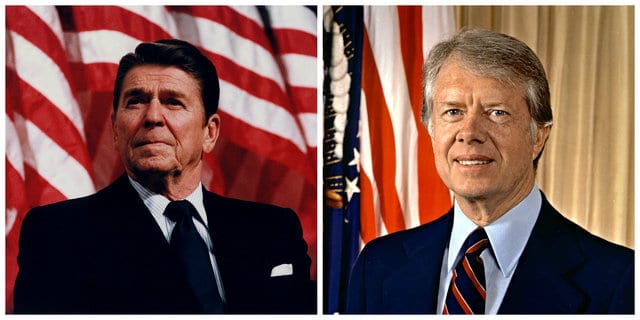One of the great advantages to being in the investment business since the mid-1960s is that I get to see cycles and scenarios repeat themselves. It is unfortunate that the media, the movers and shakers in Washington, and the investment community lack this depth of perception, because adverse economic and government policies seem to be repeated all too often.
Maybe this is just part of the learning curve each generation has to go through. However, I was under the impression that “book learning” had some value that experiences could be carried and accumulated from generation to generation. It seems to me that currently most folks are focused on the here and now, with little sense of how what is going on fits into the long term historical perspective.
Bearing this in mind, I want to take you back to 1980, when the former actor/TV host and governor of California Ronald Reagan was elected over incumbent President Jimmy Carter. Reagan had been deemed an outsider, unqualified to lead the country, a cowboy (Europeans really didn’t like him), and — even worse at that time — had been divorced and remarried. Reagan first sought his party’s nomination in 1976 but was defeated at the Republican National Convention by Gerald Ford, who had been appointed President by Richard Nixon upon his own infamous resignation. In 1980, Reagan won the nomination and went on to be a two-term president, guiding the economy to its second longest peacetime economic expansion in U.S. history.
To be clear, I’m writing this from my perspective as a participant in the investment markets at that time and from my recollection of the events of the day. As we entered the beginnings of the Reagan presidency, inflation was rampant, unemployment was very high and the economy as well as the stock market were moribund. The politicians of the status quo could not see any way out of this predicament and thought we were stuck in a perpetual low-growth economy guided mostly by monetary policy.
Much more recently, we’ve had the same low labor participation rates not seen since the early 1980s, and although we have no inflation by the standard numbers, the economy has been stuck in low gear for the past eight years. So as they did in 1980, voters today are promoting a Washington outsider to guide government and economic policy and perhaps get the American economy growing faster (above 3 percent per year) again.
The answer to the moribund economy lies in fiscal policies that will encourage entrepreneurs to start new businesses, encourage the capital markets (including banks) to finance startups (privately, not government startups, please), expand hiring and allow corporations and small businesses to keep more of their earnings that may then be used for research and development, new plants, equipment, and expansion efforts instead of for mergers, stock buybacks, higher dividends and executive bonuses. All of this would be helped if the government rules and regulations were rolled back (especially Dodd-Frank, which has punished small banks and investment firms for the sins of the large banks and brokerage firms).
We have the opportunity under the right president to pivot the economy to more growth, reduce onerous regulation to more effective regulation, reduce taxes on production and bring back the $2 trillion our corporations have parked overseas to avoid the 35 percent tax rates we impose on repatriated earnings (on which taxes have already been paid in foreign countries). Two trillion of new capital in our economy could make a real difference if directed toward getting America growing again.
We, the American voters, rejected the status quo policies of President Carter and his advisors and elected a president committed to shaking up the moribund policies and conversations of Washington. The excellent growth in the economy in the 1980s and 1990 is a matter of history and was a wonderful time to be in the investment business as well as a participant in the greater economy. We have that opportunity in front of us again. Let’s hope we don’t blow it. Too much depends on it.
The opinions expressed above are those of the author and do not necessarily reflect those of Nestlerode & Loy, Inc. or StateCollege.com.



